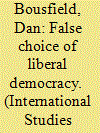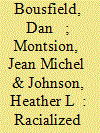| Srl | Item |
| 1 |
ID:
106356


|
|
|
|
|
| Publication |
2011.
|
| Summary/Abstract |
This article discusses practical forms of participatory assessment in the international relations (IR) classroom to examine the relationship between teaching and practicing democracy. These techniques include a series of exercises that allow students to explore the links between IR course content and classroom pedagogy. Drawing on the work of Slavoj Žižek, this study examines the ways in which participatory teaching methods challenge students to think about freedom and participation in the classroom and in general. Creating a responsive and participatory classroom generates important questions about the nature of foreign policy creation and the practical and ideological limits on democracy in IR.
|
|
|
|
|
|
|
|
|
|
|
|
|
|
|
|
| 2 |
ID:
165255


|
|
|
|
|
| Summary/Abstract |
International relations (IR) is traditionally taught from a detached standpoint, as the international realm is conceptualized as distinct from normative, emotional, and embodied realities. We challenge this abstraction and focus on emotions to examine the intersection of race and international relations in how we teach and how students learn. Focusing on emotional labor, we maintain that students are taught and learn about the presence and absence of race in the discipline in specific ways. As teachers and affective leaders, we manage student emotions at the intersections of race and international relations, including when to make these feelings visible and how to connect them to racialized narratives. After a brief review of recent critical scholarship on race in the discipline, we present a conversation in which we highlight our own affective leadership, emotional labor, and pedagogical strategies in the international relations classroom, as they pertain to engaging with issues of race and racism.
|
|
|
|
|
|
|
|
|
|
|
|
|
|
|
|